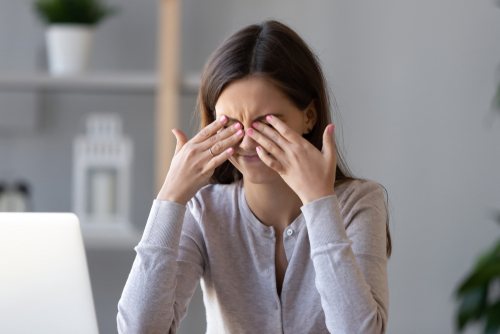
As allergy season approaches, many people will also start dealing with the frustrating symptoms of dry eye syndrome. But what many people don’t realize is there are a lot of myths out there about dry eyes.
Not sure what to believe anymore? Keep reading for 7 of the top dry eye myths to avoid!
1. If you have allergies, you can’t get dry eye as well
There are plenty of allergy sufferers out there that wish this myth was true, but it’s not. Unfortunately, if you have allergies, you can also get dry eye syndrome.
Your environment can be the cause of dry eyes, but it’s not the only one. In many cases, the reason you have dry eyes is because of your tears.
It’s usually because of the quality of your tears or because you aren’t producing enough. If this is the case, having allergies is only going to make your dry eye symptoms worse.
If you find that your dry eyes and allergies are bothering you a lot, pre-treatment is a good idea. Before your allergy symptoms begin, start taking antihistamines.
This will allow the antihistamines more time to activate in your body. This lets your body take more time to fight off the allergic reaction that occurs when you come in contact with allergens like pollen.
2. There are no treatment options for dry eye
False! There are plenty of treatment options for having dry eyes. Depending on the severity of your symptoms, you may even be able to treat your dry eye yourself with diet and environmental changes.
It can often take a combination of things like lifestyle changes, drinking more water, and using eye drops before people see relief. For some people, this is enough, but for others, they will need to see their eye doctor for medical treatment.
Talk to your eye doctor if your dry eye won’t get better even after you’ve tried to treat it naturally.
3. You can only have dry eye if your eyes are dry
Although it would make sense that dry eye syndrome makes your eyes dry, it’s not the only symptom that comes along with this condition. Other common symptoms of dry eye include:
● Eye fatigue
● Irritation
● Watery eyes
● Foreign body sensation of something being in your eye
● Uncontrollable tearing
● Redness
● Experiencing difficulty wearing contact lenses
● Light sensitivity
● Stringy mucus developing in or around your eyes
● Experiencing a burning or stinging sensation in your eyes
If you experience any of these symptoms or any sudden changes to your vision, let your eye doctor know. Though they are common signs of dry eye syndrome, they could also be signs of another eye condition.
4. Dry eye doesn’t go away
There can be a feeling of despair for those that have dry eyes. It may feel like you’ll be stuck with uncomfortable, itchy, dry eyes forever!
But it doesn’t have to be that way. The key to getting relief from dry eye syndrome is understanding the root of what is causing your symptoms.
The best way to do this is to see your eye doctor. Explain to them that you are experiencing dry eye symptoms and are looking for relief.
They may test the quality of your tears, along with how many tears you are able to produce. These things help them determine why your eyes are dry and what they need to do to treat and fix the problem.
5. Eye drops or artificial tears are enough to treat dry eye
Eye drops and artificial tears can provide excellent relief when it comes to living with the symptoms of dry eye syndrome. But that doesn’t mean they are always going to be enough to treat every case of dry eye.
Many patients only find the relief they are looking for through a combination of things like lifestyle changes, adding omega-3 fatty acids to their diet, and other recommendations. You may also benefit from medications like Xiidra eye drops, punctal plugs, warm compresses, or other dry eye treatment options.
Talk to your eye doctor to come up with an individual treatment plan that will give you the lasting relief you need!
6. Dry eyes can’t cause any lasting damage to your vision
Dry eyes aren’t that big of a deal, right? This isn’t true either. Left untreated, dry eyes can leave a lasting impact on your vision and how you see.
When your tears are low quality or you aren’t producing enough of them, it can negatively affect the health of your cornea. This could mean your cornea becomes inflamed.
The inflammation could also lead to open sores or even corneal scarring. If you develop corneal scars and leave them untreated, this can lead to permanent vision loss.
You may develop blurred vision if you leave dry eye untreated. The tear film is an important part of how your cornea operates and why you can see clearly.
Without enough tears to cover the surface of the cornea, your vision may not be as sharp as it should be. If your vision feels off or as if it’s undergone any sudden changes, it’s important to always let your eye doctor know.
7. Only dry air causes dry eyes
It would seem logical that dry environments and dry air are the cause of dry eyes, but there’s more to it than that. At its core, dry eye syndrome is about your tears. If you don’t have enough tears or the tears your eyes produce are not the best quality, your eyes will suffer as a result of this.
But there is a kernel of truth to the idea that being in dry environments can cause dry eye. If you already have dry eye syndrome, you should avoid dry environments when possible, as they can aggravate your eyes further.
This also includes avoiding anything that may blow dry air into your eyes, like hairdryers, radiators, fans, and air conditioning units. If you must use these things, consider buying humidifiers that you can put in the rooms you’re in most throughout your home.
Make sure this includes your bedroom, as your eyes can lose a lot of their moisture while you’re sleeping. Humidifiers are an easy and relatively inexpensive way to add more moisture to the air that your eyes may be lacking.
Tired of living with the frustrating symptoms of dry eye syndrome? Diagnostic Eye Center is here to help!
Schedule an appointment with one of our eye doctors in Houston, TX and get your dry eye symptoms under control, once and for all!

